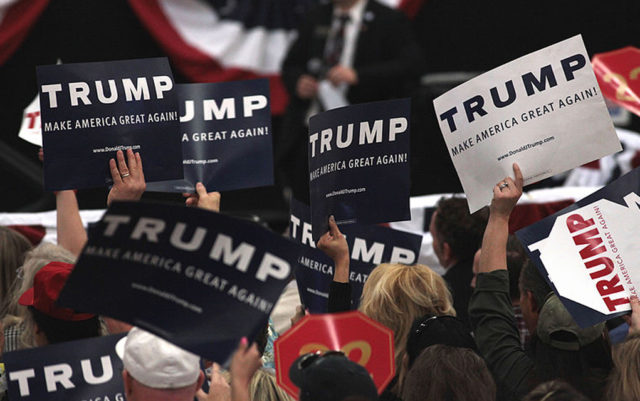
Only 11 percent of the media coverage of the 2016 presidential primaries dealt with the candidates’ policy positions, leadership abilities and professional histories according to a study by the Shorenstein Center on Media, Politics and Public Policy. Instead, there were stories of personality conflicts, gossip, scandals, campaign strategy and polls.
Politics has been treated as entertainment for a long time but Donald Trump made things worse. As a celebrity and TV star, he developed the skills to manipulate the media. His business career taught him to “play to people’s fantasies,” as he (or rather his ghostwriter) wrote in The Art of the Deal. He added, “People want to believe that something is the biggest and the greatest and the most spectacular. I call it truthful hyperbole. It’s an innocent form of exaggeration — and it’s a very effective form of promotion.”
The Trump circus continues to dominate the news with everybody discussing his latest outrageous insults, lies and conspiracy theories. Meanwhile, the Republicans quietly plan to turn back the clock several decades now that they control the presidency, the Congress, 32 state legislatures and 33 governorships. Many noticed this and a resistance was born.
It was organized spontaneously on social media. On the day after Trump’s inauguration, about 5 million Americans turned out for the Women’s March in Washington, D.C. and the sister marches in over 600 other cities. This was one of the biggest protests in U.S. history. Less than a week later, huge crowds marched again opposing Trump’s Muslim ban. When people from the banned countries were being detained at airports, lawyers and protesters showed up.
Widespread protest has continued at the offices of Republican members of Congress and at town hall meetings. Can we keep up the pressure? It is difficult to sustain a sense of outrage and indignation over four years.
Right after the election, progressive economist Max Sawicky tweeted, “With a Democratic win, we’d be listing stuff to hold them to. Now we have to list things we don’t want destroyed.” But Trump wasn’t the usual rightwing Republican. He tapped into a populist fever. He promised to bring back jobs, rebuild the middle class and end stupid trade policies. He presented a classic rightwing populism that directed his supporters’ anger at (some of) the rich and powerful and a violent criminal underclass who are ruining the country. He claimed that his solutions — tax cuts for the rich, decimation of business regulations, Obamacare repeal — would bring back the American dream.
Actually these solutions would make the lives of ordinary Americans even worse.
We progressives have to resist, but we need to be pushing a strong alternative. The ideas and programs are already there: Medicare for all, tuition-free college, expanded Social Security benefits, progressive taxation and a Green New Deal that will start a “just transition” from fossil fuel jobs to jobs in renewables. That was Bernie’s message in the primaries.
Hillary had a similar if milder bunch of proposals. But in the general election she figured she would emphasize the perfectly sensible notion that Trump was spectacularly unfit to be president. She calculated that people would prefer a good manager with a “steady hand” who would continue the Obama status quo.
There are furious debates over why Trump became president. The Clinton campaign was criticized for not campaigning much in the Rust Belt, and the Republicans for engaging in voter suppression of racial minorities in many parts of the country. Hillary won the election by three million votes but lost in the Electoral College. You can cite many more factors.
But where do we go from here? Longtime union organizer Marshall Ganz argued that progressives need to start at the grassroots. In an interview on Talking Points Memo, he said, “Conservatives successfully created a more or less coherent network of organizations linked to local, state and national politics, which is a traditional form of effective political organization in the U.S.” They organized in evangelical churches, the religious schools that Betsy DeVos helped sponsor, the gun clubs, the NRA, the Koch brothers network and ALEC.
He argued, “Many Democrats confuse messaging with educating, marketing with organizing. They think it is all about branding when it is really about relational work. You engage people with each other, creating collective capacity. That’s how you sustain and grow and get leadership.”
Ganz wants progressives to learn from the unions. He said, “When you are organizing a union, a workplace, you have got to organize who’s there. One of the troubles with the progressive groups is that they respond to those who already agree with them, but don’t have much incentive to actually go out and build a base by persuading and engaging and converting those who don’t. If you are organizing a union, you have to do that, because that’s how you win. Now ignoring all these red and purple states is like pretending you don’t need them to win, but you do.”
It isn’t easy. We need to resist. But we will win if we present an alternative moral vision of how we can create a better society.
This opinion column does not necessarily reflect the views of Boulder Weekly.














